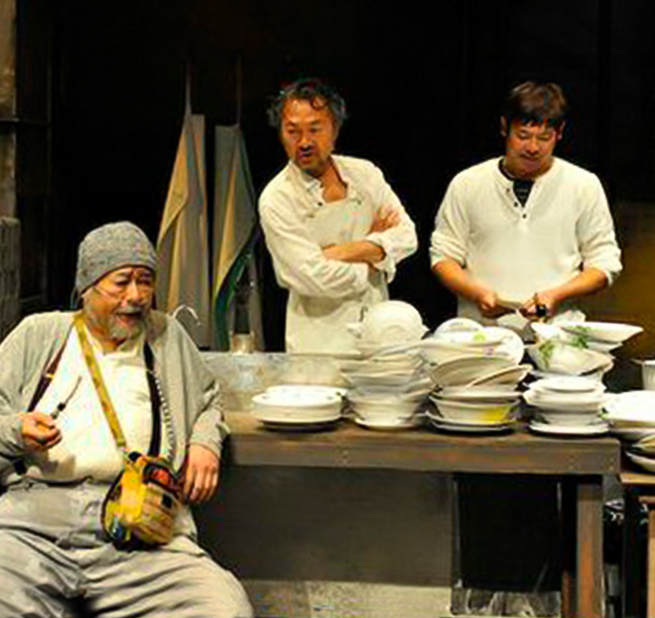
Why Canadian playwrights are big in Japan
NOW Magazine | Editor: Glenn Sumi
Published: September 2016
What do Nicolas Billon, Morris Panych, Hannah Moscovitch and George F. Walker have in common?
They’re big in Japan, thanks largely to one individual: Toyoshi Yoshihara. In a career spanning nearly half a century, Yoshi has translated more than 50 Canadian plays from English into Japanese, a contribution that earned him the Order of Canada in 2003.
But while the artists whose work he translates gain international exposure, Yoshi stays behind the scenes. In fact, he scarcely even makes contact with the playwrights themselves.
Translating a play without a conversation with its playwright might make Yoshi’s work seem more technical than artistic. But according to Billon, for whom Yoshi has translated The Elephant Song, Iceland and Butcher, it’s both.
“I think there’s a real balance between art and science for translation. It can’t be only one or the other.”
No matter its nature, Yoshi’s work is a labour of love. He personally selects, translates and arranges production for the plays he works on – often before requesting permission from the playwright.
So how did a Japanese businessman fall head over heels for Canadian theatre?
In a word: language.
“When I immigrated to Canada in 1970, I did not speak English that well,” says Yoshi from his home in Tokyo. “That was exactly why I started going to theatre.”
Decades before Duolingo, Canadian plays proved an ideal teacher.
“Theatre was the only place where I could listen to the same conversations repeatedly to hone my English hearing skill. I saw the same show night after night until I completely understood what was said.”
Panych remembers seeing him at Vancouvers Arts Club during this period of self-imposed curriculum, where Yoshi saw the playwright/performer in his very first play, Last Call: A Post-nuclear Cabaret.
“He got to know us very well as an audience member,” recalls Panych.
“His first interest was learning the language, but then he fell in love with the theatre.”
Yoshi had initially moved from Japan to Vancouver in order to establish a sales network for a Japanese trading company. Play translation took place in his spare time.
His process is solitary and straightforward: he needs only a script to begin, and his translations take between one and two months. The hardest part isn’t the work itself, he claims, but finding a play worthy of translation.
“To find one, I have to read as many as 20.”
But he finds them.
Panych was impressed by Yoshi’s initiative.
“He had already begun translating my work when he asked me if I minded, and I was flattered. He didn’t have to persuade me.”
Canadian theatre was integral to Yoshi’s understanding of Canada. It’s one reason why he was so eager to export these stories back to Japan, he says.
“‘A rich and peaceful country with abundant natural beauty’ is the general conception the Japanese have of Canada,” he says.
He complicated our national identity by sending home Japanese translations of George Ryga’s The Ecstasy Of Rita Joe, Lee MacDougall’s High Life and George F. Walker’s Problem Child, to name just a few.
“I think I was able to correct such misconception to a certain limited extent.”
Nearly four decades later, Yoshi has translated 73 plays, 53 of them written by a Canadian author. His nuanced understanding of both Canadian theatre and Japanese audiences has allowed him to remain active despite having returned to Japan in 2011.
For instance, he recognizes some work might not play well overseas, like David French’s Salt-Water Moon.
“[French’s] plays are great but can’t be fully appreciated unless you know the peculiarity of Newfoundland culture,” says Yoshi, “of which Japanese audiences are completely ignorant.”
On the other hand, cultural recontextualization offers some stories new relevance.
Moscovitch was initially apprehensive about how East Of Berlin and its examination of the legacy of the Holocaust would be received by audiences in a formerly Axis-aligned country like Japan.
But that’s precisely why Yoshi suspected it would resonate. He timed his translation to coincide with a national conversation about war crimes – specifically, the Japanese military’s involvement in the Nanking Massacre.
East Of Berlin was so successful in Japan that Moscovitch has been commissioned to write a new piece examining the aftermath of another wartime atrocity: the atomic bomb dropped on Hiroshima on August 6, 1945.
Yoshi’s interests don’t extend to the cinema (“[it’s] too explanatory”) and this singular focus has earned him the trust of Canadian playwrights.
He won Billon’s easily.
“When you’re being translated into a language you don’t speak, there’s really no way to know how good a job the person has done. [But because he] had such a track record, particularly with Canadian plays, it didn’t make any sense not to go with Yoshi.”
Walker says these leaps of faith aren’t unique to translation. Artistic interpretation is an integral part of a theatrical work, be it through direction, design or the performances of the actors who bring life to the words on the page.
“The giving away of plays is a great trust exercise,” says Panych, “but that’s the nature of playwriting. The text is never the end of it.”
Yoshi rewards this trust by personally advocating for Japanese productions of translated work.
“I think it really makes a difference for a Tokyo theatre to get recommendations from someone they trust,” says Billon. “But, perhaps more importantly, he was very much a champion of the play and that’s kind of what you want in a translator.”
When Billon had the opportunity to travel to Tokyo to catch a production of Yoshi’s translation of Butcher, he felt confident of its success, despite the language barrier.
“I think [the production] really captured the essence of the characters. You don’t need a translation for that.”
Thousands of kilometres from their point of origin, Canadian plays still hit home. Perhaps it’s no surprise considering the cultural diversity within our own borders.
Moscovitch says no matter where she goes, audiences are interested in comparing experiences of citizenship. For Panych, our shared humanity makes these stories universal.
“People everywhere have hearts and minds. Tapping into them is, and always has been, a deeply personal pursuit.”
Yoshi agrees. And though he’s just turned 80, he wants to continue to bring pieces of Canada to Japan.
“Jordan Tannahill’s Concord Floral and Late Company are the next Canadian plays I would like to translate.”
So much for retirement.

